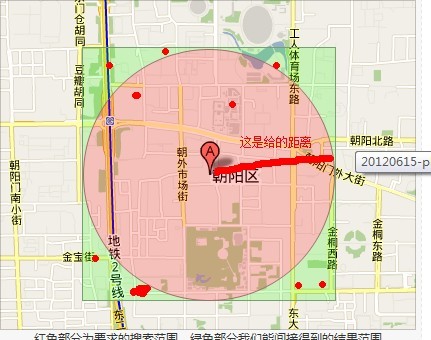mahout算法源码分析之Itembased Collaborative Filtering(三)RowSimilarityJob验证
Mahout版本:0.7,hadoop版本:1.0.4,jdk:1.7.0_25 64bit。
本篇分析上篇的分析是否正确,主要是编写上篇输出文件的读取以及添加log信息打印相关变量。
首先,编写下面的测试文件分析所有的输出:
[java]
package mahout.fansy.item;
import java.io.IOException;
import java.util.Map;
import mahout.fansy.utils.read.ReadArbiKV;
import org.apache.hadoop.conf.Configuration;
import org.apache.hadoop.fs.Path;
import org.apache.hadoop.io.Writable;
import org.apache.mahout.math.Vector;
import org.apache.mahout.math.hadoop.similarity.cooccurrence.Vectors;
import junit.framework.TestCase;
public class ReadRowSimilarityJobOut extends TestCase {
// 测试 weights 输出:
public void testWeights() throws IOException{
String path="hdfs://ubuntu:9000/user/mahout/item/temp/weights/part-r-00000";
Map<Writable,Writable> map= ReadArbiKV.readFromFile(path);
System.out.println("weights=================");
System.out.println(map);
}
//normsPath
public void testNormsPath() throws IOException{
String path="hdfs://ubuntu:9000/user/mahout/item/temp/norms.bin";
Vector map=getVector(path);
System.out.println("normsPath=================");
System.out.println(map);
}
//maxValues.bin
public void testMaxValues() throws IOException{
String path="hdfs://ubuntu:9000/user/mahout/item/temp/maxValues.bin";
Vector map=getVector(path);
System.out.println("maxValues=================");
System.out.println(map);
}
//numNonZeroEntries.bin
public void testNumNonZeroEntries() throws IOException{
String path="hdfs://ubuntu:9000/user/mahout/item/temp/numNonZeroEntries.bin";
Vector map=getVector(path);
System.out.println("numNonZeroEntries=================");
System.out.println(map);
}
//pairwiseSimilarityPath
public void testPairwiseSimilarityPath() throws IOException{
String path="hdfs://ubuntu:9000/user/mahout/item/temp/pairwiseSimilarity/part-r-00000";
Map<Writable,Writable> map= ReadArbiKV.readFromFile(path);
System.out.println("pairwiseSimilarityPath=================");
System.out.println(map);
}
//similarityMatrix
public void testSimilarityMatrix() throws IOException{
String path="hdfs://ubuntu:9000/user/mahout/item/temp/similarityMatrix/part-r-00000";
Map<Writable,Writable> map= ReadArbiKV.readFromFile(path);
System.out.println("similarityMatrix=================");
System.out.println(map);
}
// 读取.bin文件
public Vector getVector(String path){
Configuration conf=new Configuration();
conf.set("mapred.job.tracker", "ubuntu:9001");
Vector vector=null;
try {
vector = Vectors.read(new Path(path), conf);
} catch (IOException e) {
e.printStackTrace();
}
return vector;
}
}
运行上面的文件得到下面的输出:
[plain]
weights=================
{1={103:2.5,102:3.0,101:5.0}, 2={101:2.0,104:2.0,103:5.0,102:2.5}, 3={101:2.5,107:5.0,105:4.5,104:4.0}, 4={101:5.0,106:4.0,104:4.5,103:3.0}, 5={106:4.0,105:3.5,104:4.0,103:2.0,102:3.0,101:4.0}}
normsPath=================
{107:25.0,106:32.0,105:32.5,104:56.25,103:44.25,102:24.25,101:76.25}
maxValues=================
{}
numNonZeroEntries=================
{}
pairwiseSimilarityPath=================
{102={106:0.14972506706560876,105:0.14328432723886902,104:0.12789210656028413,103:0.1975496259559987}, 103={106:0.1424339656566283,105:0.11208890297777215,104:0.14037600977966974}, 101={107:0.10275248635596666,106:0.1424339656566283,105:0.1158457425543559,104:0.16015261286229274,103:0.15548737703860027,102:0.14201473202245876}, 106={}, 107={}, 104={107:0.13472338607037426,106:0.18181818181818182,105:0.16736577623297264}, 105={107:0.2204812092115424,106:0.14201473202245876}}
similarityMatrix=================
{102={101:0.14201473202245876,106:0.14972506706560876,105:0.14328432723886902,104:0.12789210656028413,103:0.1975496259559987}, 103={101:0.15548737703860027,106:0.1424339656566283,105:0.11208890297777215,104:0.14037600977966974,102:0.1975496259559987}, 101={107:0.10275248635596666,106:0.1424339656566283,105:0.1158457425543559,104:0.16015261286229274,103:0.15548737703860027,102:0.14201473202245876}, 106={101:0.1424339656566283,105:0.14201473202245876,104:0.18181818181818182,103:0.1424339656566283,102:0.14972506706560876}, 107={105:0.2204812092115424,104:0.13472338607037426,101:0.10275248635596666}, 104={107:0.13472338607037426,106:0.18181818181818182,105:0.16736577623297264,103:0.14037600977966974,102:0.12789210656028413,101:0.16015261286229274}, 105={107:0.2204812092115424,106:0.14201473202245876,104:0.16736577623297264,103:0.11208890297777215,102:0.14328432723886902,101:0.1158457425543559}}
其中第一个weights就和分析的一模一样,这里就不再相信写了。那就只分析pairwiseSimilarityPath和similarityMatrix了:
补充:软件开发 , Java ,





